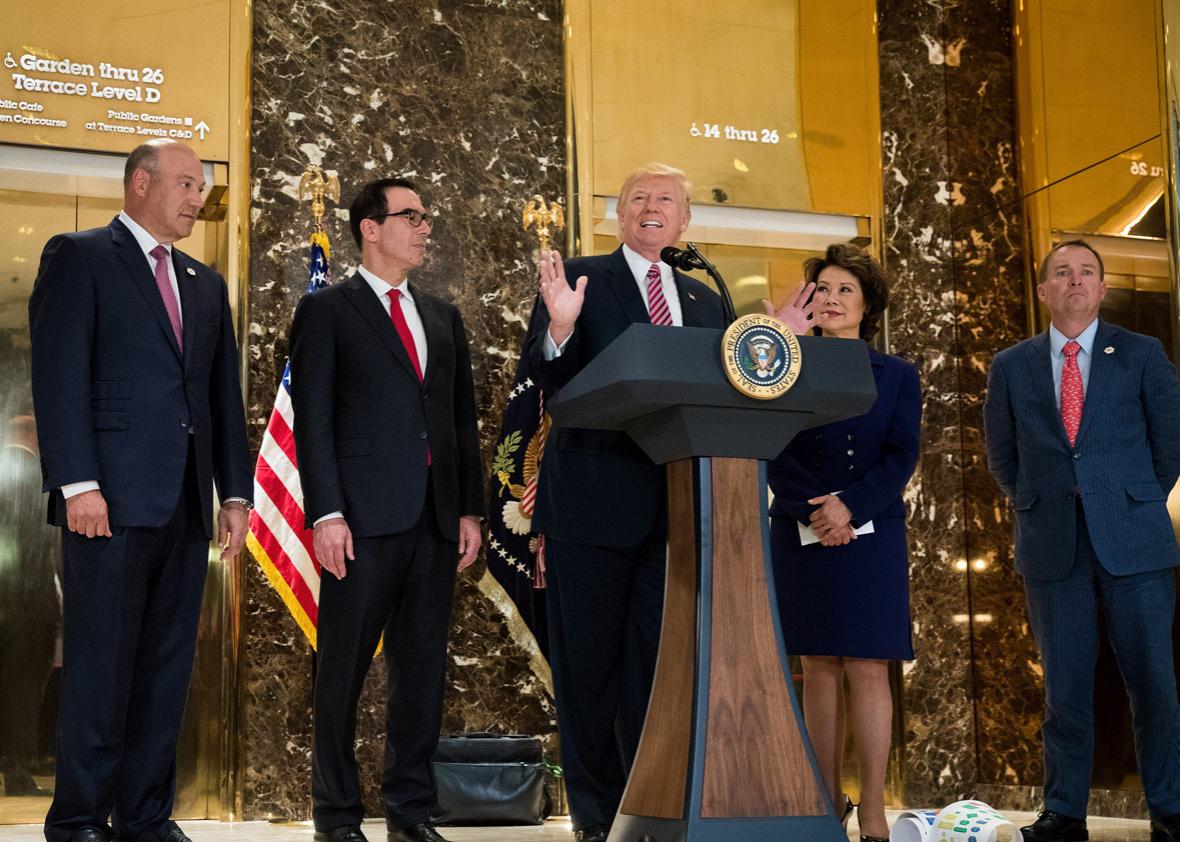It wasn’t long after President Trump’s shocking defense of the white supremacists who marched on Charlottesville that a phalanx of prominent Republicans had either condemned or distanced themselves from his remarks.
“We must be clear. White supremacy is repulsive. This bigotry is counter to all this country stands for. There can be no moral ambiguity,” tweeted House Speaker Paul Ryan. “Mr. President, you can’t allow #WhiteSupremacists to share only part of the blame,” said Florida Sen. Marco Rubio in a “thread“ of tweets. “They support idea[s] which cost [the] nation & world so much pain.” “We should never hesitate to call out hate. Whenever and wherever we see it,” declared Utah Sen. Orrin Hatch. “There are no good neo-Nazis, and those who espouse their views are not supporters of American ideals and freedoms,” said Senate Majority Leader Mitch McConnell in a statement from his office.
Together, these read as a single message: Irrespective of the president, the GOP doesn’t brook or apologize for white supremacists and neo-Nazis. This is an extraordinarily low bar to meet for decency, what George W. Bush might call the “soft bigotry of low expectations.” And while it’s true these statements put real distance between the mainstream Republican Party and the overt racism we saw in Charlottesville, they also obscure a larger, less flattering truth: Republican politicians might reject explicit calls for white supremacy, but they show no aversion to policies that target and disadvantage nonwhites. The newfound visibility of these hate groups, in fact, serves the party by clouding its support for a host of racially disparate policies.
For all its condemnation of white supremacy, in other words, the Republican Party has been more than willing to enable both racist messaging and public policy.
Take Paul Ryan. It’s true that during the presidential campaign, the Wisconsin Republican criticized and occasionally condemned his party’s nominee. But at no point would he reject Trump as an unacceptable leader for the party, even as the onetime reality star indulged the prejudice and resentment of his supporters, to say nothing of what was revealed about his own open misogyny and racism.
McConnell and Rubio, meanwhile, may feel sincere revulsion at Trump’s actions on Tuesday. But they showed no qualms about confirming Alabama Sen. Jeff Sessions as attorney general, despite Sessions’ own history as an opponent of vigorous civil rights enforcement. When a younger Sessions faced the Senate for confirmation to the federal bench in the 1980s, he was rejected because of conduct as a federal prosecutor, which included harassing civil rights works in Alabama and an alleged joke about his fondness for the Ku Klux Klan. In a letter to the Senate Judiciary Committee, Coretta Scott King was succinct—and still correct—in her assessment of Sessions, noting his “indifference toward criminal violations of civil rights laws” and warning that he would “irreparably damage” the work of those who “risked their life and freedom … to ensure equal participation in our democratic system.”
To that point, as attorney general, Sessions has used the broad power of his office to relax enforcement of civil rights laws, re-evaluate (and potentially rescind) “consent agreements” meant to reform abusive police departments, and consider embarking on a plan to root out alleged discrimination against whites in college admissions. His Department of Justice has also given the green light for states to purge their voter rolls in ways that will disadvantage more marginal voters, including many black Americans. All of this reflects Sessions’ own commitment to white identity politics. None of it has raised the ire of Republican lawmakers.
Donald Trump also employs Stephen Bannon and Sebastian Gorka in his White House, two figures with clear ties to white nationalists and right-wing extremists. If they chose, Republican opponents of white supremacy like Orrin Hatch could use their clout to issue an ultimatum: Relieve these men of their responsibilities or we will refuse to move on your agenda. This has not happened.
Sen. Todd Young, an Indiana Republican, believes his party should “condemn and marginalize white supremacist groups, not encourage and embolden them.” It’s an admirable stance. At the same time, Young has been silent as his state erected barriers to voting in counties where black Americans reside. And while the stated reason for these moves is partisan, the practical effect is the same, making the distinction essentially metaphysical.
Leading Republicans like Sen. John McCain despise racism—”There’s no moral equivalency between racists & Americans standing up to defy hate & bigotry”—but are absent from the fight to restore the Voting Rights Act. They condemn white supremacy, but they have watched with little complaint as colleague after colleague has weaponized white resentment to win votes and drum up activist energy.
Make no mistake, it is extraordinary that senior Republicans have stepped up to criticize the president, both directly and indirectly. It is a sign that the alliance between Trump and the Republican Party is increasingly tenuous, and that Trump’s rising unpopularity threatens to destroy the entire edifice. But we should not forget that the GOP was primed for someone like Trump to take hold of the party’s voters. A new survey shows that 11 percent of Trump voters believe the white nationalists who attended the rally in Charlottesville were “mostly right” and that 37 percent believe “they went too far, but they have a point.” Trump alone isn’t responsible for the fact that nearly half of Republican voters sympathize with white supremacists: He didn’t build that.
No, that is the product of a Republican Party that, for decades, has either tolerated racism or stoked white resentment for its own electoral gain—a Republican Party that wouldn’t push back when its base adopted birtherism and that doesn’t challenge the racist fearmongering from its interlocutors in conservative media.
Since Saturday’s violence in Charlottesville, the Republican Party sans Trump has spoken clearly: It hates white supremacy and racism in all of its forms. The GOP’s actions, unfortunately, say otherwise.
